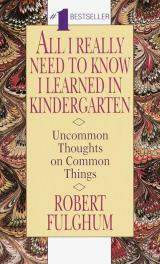
Calvin and Hobbes is one of the funniest and most intelligent creations on the planet. Honestly. Bill Watterson is a genius.
Whenever I’m feeling unhappy or upset, I can always count on Calvin’s witty comments to cheer me up. Sometimes I feel as if I know Calvin as a person… although I suppose if I did, he might drive me crazy!
You know, it must take real skill to be a cartoonist. I mean, a good cartoonist. All you get is a few panels to tell a story. To draw some people and speech bubbles. But to create these characters – Calvin and Hobbes – that have their own personalities, that are so lifelike yet so comical, that are witty yet not annoying… that just blows my mind. I can flip to any random strip and I’ll love it.
It just amazes me. I must admit, when I was younger, I did try to draw my own comic strips. I thought they were hilarious at the time… but looking back, I’m a little embarrassed by them. 😛
I guess cartoonists are just generally underestimated. Comic strips are works of art. Well… if they’re done correctly. I’ve flipped through the funny pages in newspapers now, and some of those comic strips are just horrible! They’re not funny at all, and the art is nothing to be proud of. It’s just a bunch of talking heads. But the artwork in Calvin and Hobbes is amazing. Especially the dinosaurs. And of course, Spaceman Spiff.
And another thing. About Bill Watterson. I am so thankful that he did not allow Calvin and Hobbes to become commercialized. You can read about that here:
http://en.wikipedia.org/wiki/Calvin_and_Hobbes#Merchandising
Basically, Bill Watterson refused to commercialize Calvin and Hobbes because he felt that it should stand on its own as an art form, and any commercialization or merchandising would take away from the beauty. So there’s pretty much no legal Calvin and Hobbes merchandise.
The reason I am so glad Bill Watterson protected Calvin and Hobbes against commercialization is that he was right: it takes away from the beauty.
The best example I can think of is Harry Potter. I love the Harry Potter books. J.K. Rowling is a fantastic writer. But looking at how ridiculously commercialized Harry Potter has become, it’s hard to believe anyone cares about her writing style anymore. Does anyone care about how well-written Harry Potter is? How cleverly, skillfully, and fluently written it is? Or do people get all crazy and hyped up just because it’s Harry Potter?
I don’t know. I guess at the same time, you have to ask yourself: If you were J.K. Rowling and had the potential to make millions off of this stuff, wouldn’t you agree to commercialize Harry Potter? It’s not a bad thing. In fact, it’d be pretty cool to watch the whole world go crazy because of your idea. To be perfectly honest, I might choose to do it too. But… I mean… this is a bit much:
http://www.universalorlando.com/harrypotter/
At any rate, this post is getting a bit long, so I’d better wrap it up. If you’re not already familiar with Calvin and Hobbes, then I suggest you head on over to the nearest library or bookstore and go straight to the comic section… or graphic art section… or whatever section it is in which Calvin and Hobbes resides.
Trust me, you won’t regret it.
URL for the comic: http://www.gocomics.com/calvinandhobbes/1992/07/31

 First off, let’s pretend that it has only been two days since my last post. All right. Now that that has been established, let’s continue.
First off, let’s pretend that it has only been two days since my last post. All right. Now that that has been established, let’s continue.